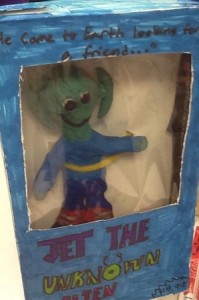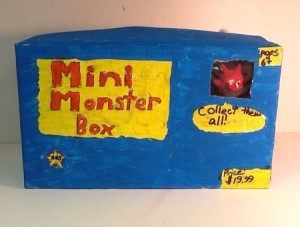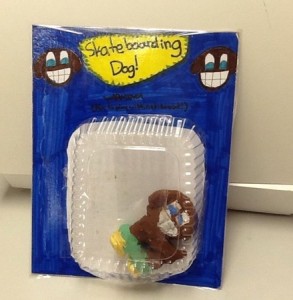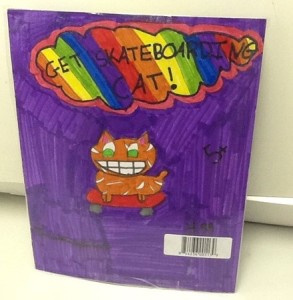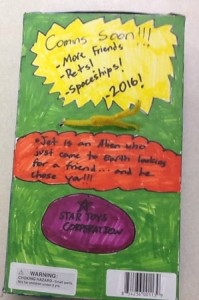Part of the Toy Production unit was making packages that would “sell” the toy. To prepare for this, I bought some toys in the type of packages I wanted my students to mimic. We spent a period examining the toys, listing the commonalities and then planning our own packages. We determined bright colors, a catchy name, company name and contact info, warnings and an image of the toy were all necessary for our packages.
Students had the option of some clear plastic cam shells (bought at the local restaurant supply store) or cardboard boxes. I enlisted the school kitchen and custodians to save all shoebox sized boxes. Students painted them, often with a coat of gesso first, and cut out viewing windows that we backed with old overhead sheets I had in some storage drawer. (Art teachers are hoarders!)
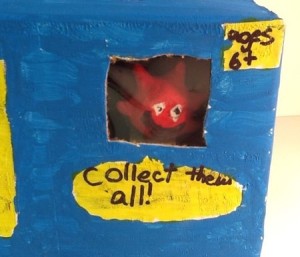
This student only wanted one of the set to show through his window. The toy is secured inside with wire
Students that used the cam shells, hand drew and colored or used the computer to make the front and back, then glued to an 8×10 sheet of cardboard that I had. I accidentally ordered a huge box of 1000 of these pieces of thin cardboard and haven’t found a use for them yet, so this was perfect. If they wanted, I laminated the package for them before they added the toy and cam shell. My laminator didn’t like that though… A little too thick. So they needed to still tape the edges. We used both hot glue and staples to attach the cam shells to the laminated cardboard.
The packaging caused many design problems for the students to solve. When I do this project again, I will do more whole class mini lessons, prior to packaging time, so they have the skills they need. This time the mini lessons were more one on one and then when the next kid needed to know… I enlisted the perviously taught kids to peer mentor the new one. This works too, just in time instruction has its benefits, but I also felt a few steps behind the kids the whole time.
For my own reminder…package related mini lessons might include: What is gesso? How to paint it on a surface and how to properly clean the brush afterwards. How to cut a hole in the center of a surface, safely using an exacto blade. How to create a lid from a flat sheet of cardboard. Proper use and safety of the hot glue gun. How to measure a 3-D sculpture to determine what size box will fit best. How to poke a hole with a pin tool and feed wire for securing the object inside the box.

